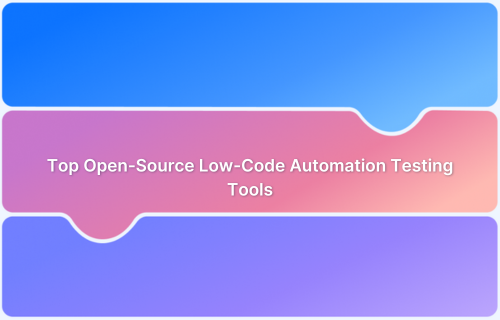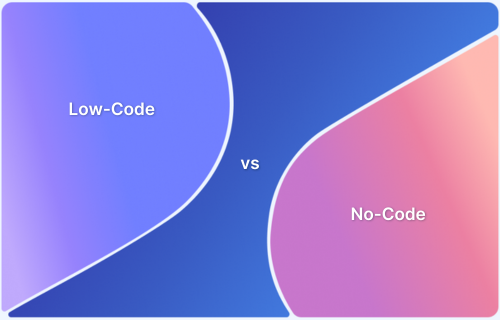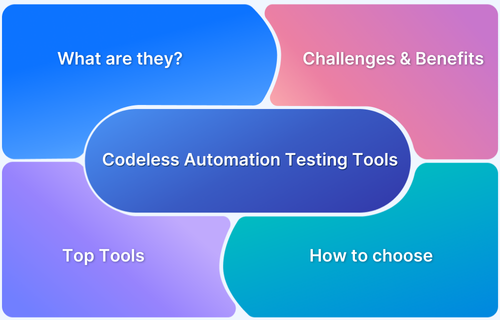Katalon is a widely used low-code automation platform that supports web, API, desktop, and mobile testing.
While it offers strong AI-assisted features and collaboration tools, some teams face limitations around pricing, performance, and advanced customization.
Overview
Top Katalon Alternatives:
- BrowserStack Low-Code Automation: AI-powered self-healing with real-device testing for web and mobile.
- Reflect.run: No-code browser testing with simple recording and automation.
- Appsmith: Open-source platform with strong integrations and flexible deployment.
- UI Bakery: Rapid internal app building with scalable data integrations.
- Appian: Enterprise-grade automation platform for complex workflows.
- Rainforest QA: Cloud automation with AI and on-demand crowd testing.
- Xano: No-code backend builder with scalable API development.
- Mendix: Comprehensive low-code platform for building web, mobile, and IoT apps.
- Studio Creatio: Workflow and CRM automation with AI-powered tools.
- Leapwork: Visual no-code automation using flowcharts across systems.
- Functionize: AI-powered codeless web testing with Chrome recording.
- Virtuoso QA: Natural-language and AI-driven authoring for web automation.
This guide explores the best Katalon alternatives, highlighting their key strengths so you can choose the right tool for your testing needs.
What is Katalon?
Katalon is a low-code automation platform that supports web, API, desktop, and mobile testing.
With AI-powered features and an intuitive interface, it makes test automation accessible to both technical and non-technical team members, helping organizations accelerate quality delivery.
Key Features / Use Cases:
- Visual Testing: Detects UI regressions and image-based issues to ensure accurate rendering across applications.
- AI-Powered TrueTest: Automates user-journey discovery and simplifies test maintenance with AI-driven insights.
- Jira Integration: Allows testers to generate and manage tests directly from Jira issues for seamless collaboration.
- Low-Code Scripting: StudioAssist guides users in creating and maintaining tests with minimal coding effort.
Why Consider Katalon Alternatives?
Katalon is a powerful platform, but it may not fit every team’s requirements. Its pricing structure, performance at scale, and dependency on scripting for advanced logic can create challenges for some organizations.
Common Reasons To Explore Alternatives:
- AI features are still evolving and not always production-ready
- Performance may slow down with very large test suites
- Advanced features and enterprise management are tied to premium tiers
Katalon Alternatives: Quick Overview
Several platforms provide capabilities similar to or beyond Katalon. The table below highlights their pros and cons for easy comparison.
| Tool | Pros | Cons | Free Plan |
|---|---|---|---|
| BrowserStack Low-Code Automation | AI-powered self-healing, real-device testing, low-code authoring | Advanced features available in paid plans | ✅ Unlimited test creation |
| Reflect.run | No-code browser testing, fast setup | Limited to web apps, pricing grows with usage | ❌ |
| Appsmith | Open source, flexible deployment options | Performance issues on complex pages | ✅ Up to 5 users |
| UI Bakery | Rapid app creation, flexible data integrations | Limited mobile support, costs scale with users | ✅ |
| Appian | Enterprise-scale automation, strong governance | Expensive, steep learning curve | ❌ |
| Rainforest QA | Easy no-code authoring, AI plus crowd testing | Web-only, costly for large suites | ❌ |
| Xano | Fast backend development, scalable APIs | Backend-only, advanced features need expertise | ✅ Starter plan |
| Studio Creatio | AI-powered workflows, CRM automation | Higher tiers for advanced features, no free plan | ❌ |
| Leapwork | Visual flow-based automation, cross-platform support | Expensive, setup complexity at scale | ❌ |
| Functionize | AI-powered test creation, scalable cloud execution | Web-only focus, advanced features cost more | ❌ |
| Virtuoso QA | Natural-language authoring, AI-driven stability | Limited advanced scripting, premium pricing | ❌ |
Top 12 Katalon Alternatives
Below are the leading platforms teams often compare with Katalon. Each tool provides distinct strengths to meet different testing and development needs.
1. BrowserStack Low-Code Automation
BrowserStack Low-Code Automation empowers teams to create, run, and maintain automated tests without writing code.
It combines an interactive test recorder, AI-powered self-healing, and real device cloud testing so teams can begin testing and start automation in minutes and scale across browsers and devices.
With AI-powered self-healing and low-code authoring agents, it speeds up test creation by up to 10x and reduces build failures by up to 40%, delivering faster, more stable automation for both technical and non-technical users.
Key Features of BrowserStack Low-Code Automation:
- Test Recorder: Easily capture user actions like clicks and form inputs and transform them into automated tests. This recorder supports complex functional validations including visual and text validations.
- Readable Test Steps: Actions recorded are converted into simple, human-readable English instructions, making it easy for anyone to understand and modify tests.
- Visual Validation: Enables testers to add checkpoints during recording that verify the correct display of UI components or screens, ensuring that visual elements render as expected.
- AI-Powered Self-Healing: Uses AI to detect when UI elements change and automatically updates the test to prevent failures. This minimizes the need for manual test maintenance.
- Low-Code Authoring Agent: Uses AI to turn natural language prompts into executable test steps, automating tasks from simple instructions.
- Cross-Browser & Mobile Testing: Runs tests on real desktop browsers and mobile devices in the BrowserStack cloud, covering a wide range of operating systems and devices.
- Data-Driven Testing: Allows the same test to be executed with different input values, enabling broader coverage of scenarios without creating separate tests.
- Reusable Modules:Lets teams save common sequences of steps as reusable modules that can be inserted into multiple test cases, reducing duplication and simplifying maintenance.
- API Step Integration: Adds flexibility by letting testers call APIs from within the test for tasks such as generating data, setting up test conditions, or cleaning up databases.
- Test Scheduling and CI/CD Integration: Enables automated tests to run on a set schedule or trigger directly from build pipelines via REST APIs or popular CI tools, ensuring continuous validation without manual intervention.
- Test Editing Without Re-Recording: Allows testers to open an existing test and modify, insert, or delete steps without having to re-record the whole test, saving time during maintenance.
- Private Environment Testing & Email Notifications: Teams can test websites behind firewalls or on internal and staging environments with zero setup. It also sends detailed email reports with build pass/fail status and logs, giving stakeholders timely insights while validating applications securely.
Pricing:
- Free Plan: Offers unlimited test creation along with AI-generated test data, intelligent wait handling, API steps, secure private environment testing, video debugging, and 24×7 support.
- Paid Plan: Unlocks AI agents, advanced self-healing, parallel execution, and enterprise-grade features, with custom pricing based on organizational needs.
Get Started with BrowserStack Low Code Automation for Free
2. Reflect.run
Reflect is a no-code end-to-end testing platform that uses an interactive cloud browser to record and automate any action on the web, making it approachable for non-technical contributors.
Key Features:
- Cloud-based interactive browser for test authoring
- Automatic selector generation to reduce flakiness
- Native CI integrations with video and log capture
Pros:
- Quick to create and maintain tests across skill levels
- Fully hosted infrastructure with detailed reporting
Cons:
- Limited mainly to web testing
- Costs increase with higher usage
Pricing: 14-day free trial, paid plans start at $212/month.
3. Appsmith
Appsmith is an open-source low-code platform for creating internal tools with drag-and-drop widgets, API connectivity, and built-in version control.
Key Features:
- Large library of UI widgets with database integrations
- Full JavaScript customization with built-in IDE
- Git-based version control with CI/CD support
Pros:
- Open source with active community and flexible deployment
- Strong security features including role-based access and SSO
Cons:
- Performance issues on complex, data-heavy pages
- Some advanced features locked behind business plans
Pricing: Free for up to 5 users. Business plan $15/user/month, Enterprise custom pricing.
4. UI Bakery
UI Bakery allows users to create custom internal applications and dashboards rapidly, without learning advanced UI frameworks. Its platform offers deep data connectivity, a rich set of UI components, and optional coding for advanced use cases.
Key Features
- 100+ customizable drag-and-drop UI components
- Integrates with SQL, NoSQL, REST APIs, and third-party data sources
- Visual workflow and design system with advanced branding controls
- Ability to add business logic using SQL, Python, or JavaScript
Pros
- Enables rapid data-driven app development
- Highly flexible data integration and transformations
Cons
- Some learning curve for integrating advanced code logic
- Limited out-of-the-box mobile app support
Pricing
- Free plan available (limited users)
- Paid plans start at $5/user/month or $10/developer/month; business and enterprise tiers offer more features
5. Appian
Appian is an enterprise platform for process automation and case management, combining low-code and no-code experiences for complex workflows.
Key Features:
- Process modeling and case management tools
- AI/ML-driven orchestration and analytics
- Integrations with ERPs and legacy systems
Pros:
- Highly scalable for enterprise automation
- Strong governance, audit, and compliance features
Cons:
- Expensive, with pricing only on request
- Steep learning curve for business users
Pricing: Quote-based for business and enterprise customers.
6. Rainforest QA
Rainforest QA is a cloud-based no-code automation platform for web apps, combining easy visual test authoring, machine intelligence, and on-demand crowd QA for fast test coverage.
Key Features
- Visual, no-code test authoring and editing
- Self-healing/AI-stabilized test scripts
- Parallel test execution infrastructure
Pros
- Fast test creation for teams with no coding skills
- Includes all infrastructure for automation and test management
Cons
- Designed for web only, limited desktop/mobile support
- Can be expensive with high-volume or complex suites
Pricing: Custom
7. Xano
Xano is a no-code backend platform for building APIs and workflows, designed to power front-end applications and integrate enterprise systems.
Key Features:
- Visual workflow builder for backend logic
- PostgreSQL-based relational database
- API builder for REST, GraphQL, and webhooks
Pros:
- Fast backend prototyping and deployment
- Highly scalable with modern infrastructure support
Cons:
- No built-in frontend support
- Advanced features require technical expertise
Pricing: Free plan available. Paid plans start at $25/month (Starter), $224/month (Pro), with enterprise pricing on request.
8. Mendix
Mendix is a comprehensive low-code platform for building web, mobile, and IoT apps with model-driven development and AI-assisted automation, used for enterprise-scale agile delivery.
Key Features
- Visual IDE for data models, workflows, and UIs
- Integrated DevOps/project management with collaboration tools
- Cloud-native deployment (public, private, on-premises) and extensibility
Pros
- Enables collaboration across business, IT, and mixed agile teams
- Rich marketplace for templates, widgets, integrated components
Cons
- Steep learning curve for advanced logic and customization
- Pricing escalates for enterprise-grade features
Pricing
- Free tier has basic features, standard pricing is €900/month
Learn More: Comprehensive Guide to Low-Code Development
9. Studio Creatio
Studio Creatio is an AI-augmented no-code platform focused on workflow, data, and CRM automation for enterprise needs, providing advanced governance and composability.
Key Features:
- Drag-and-drop workflow and integration builder
- AI-powered UI and app generation
- Pre-built templates for business processes
Pros:
- Empowers non-technical users with AI tools
- Scales easily for enterprise automation
Cons:
- Higher tiers required for advanced features
- Limited mobile app support compared to web
Pricing
- No free plan available, standard pricing starts at $25/user/month
10. Leapwork
Leapwork is a fully visual, no-code test automation tool for web, desktop, and enterprise systems, designed for rapid test creation with intuitive flowcharts and AI-powered stability.
Key Features
- Drag-and-drop flowchart-based test creator
- Self-healing tests with AI/ML
- Real-time analytics and reporting dashboards
Pros
- Fast onboarding for QA/business users and automation novices
- Strong for high-volume regression and end-to-end testing
Cons
- Some advanced automation limited without vendor onboarding
- May require infrastructure setup for optimal CI/CD use
Pricing: Custom Pricing
11. Functionize
Functionize is an AI-powered codeless platform for web testing with Chrome recording and scalable cloud infrastructure.
Key Features:
- AI-driven test generation and self-healing
- Chrome plugin for quick recording
- Cloud-hosted execution with parallel runs
Pros:
- Low barrier to entry, easy for product teams
- Stable, scalable tests supported by AI
Cons:
- Best for web, lacks mobile and desktop support
- Advanced features tied to higher-priced plans
Pricing: Custom pricing
Also Read: 13 Open Source AI Testing Tools
12. Virtuoso QA
Virtuoso offers low-code and no-code test automation for web apps using natural-language and AI-driven test authoring. Its cloud-first architecture scales for both manual and automated QA workflows.
Key Features
- NLP-based test scripting in plain English
- AI-powered automatic element discovery and test healing
- Parallel test execution on cloud devices/browsers
Pros
- Extremely user-friendly, approachable for non-technical users
- Visual test creation is precise and stable across browser/device types
Cons
- Not suitable for desktop or mobile native apps
- Custom logic and advanced scripting may be restricted
Pricing: Custom
Why Choose BrowserStack Low-Code Automation?
BrowserStack Low-Code Automation is designed to help teams accelerate testing, reduce maintenance, and deliver quality at scale. Its combination of AI-driven stability and real-device coverage makes it a powerful choice for modern development teams.
Key Reasons To Choose BrowserStack over Katalon:
- Comprehensive Coverage: Supports web, mobile, API, and private environment testing on a real-device cloud.
- AI-Powered Efficiency: Self-healing and low-code authoring agents speed up test creation and cut down failures.
- Low Maintenance: Reusable modules, CI/CD integration, and editable test flows reduce ongoing upkeep.
- Flexible Plans: Offers a free plan with unlimited test creation and advanced paid options for enterprises.
Conclusion
Katalon provides a solid foundation for test automation, but it may not fit every team or enterprise requirement.
Alternatives such as BrowserStack, Appsmith, Reflect, and others deliver broader coverage, greater flexibility, or more cost-effective options.
For teams seeking speed, reliability, and real-device accuracy, BrowserStack Low-Code Automation emerges as the most comprehensive solution to accelerate testing and ship high-quality software faster.








